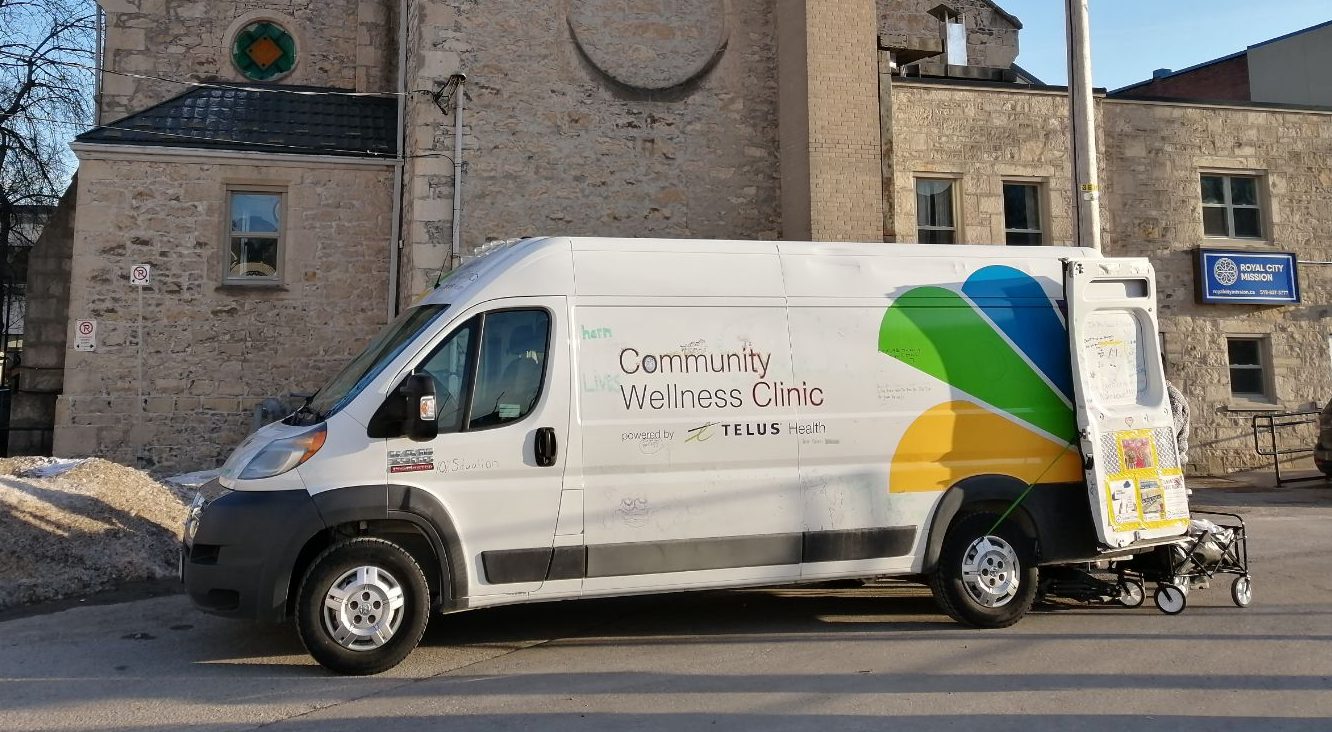GUELPH – Wellington County’s social services committee is recommending the county cover half of a funding shortfall threatening the viability of a community health care van operated by Sanguen Health Centre.
Following a presentation by the Sanguen team to the committee in October, members agreed it was worthwhile to advocate spending $90,000 in taxpayer dollars to ensure the van will continue delivering services to the county.
“We’re excited about this because [of] the connection with people living in unsheltered homelessness,” county social services administrator Luisa Artuso told the committee on Nov. 8.
In a phone interview, Sanguen community programs director Lindsay Sprague said the van team — including a nurse, a social support person, van and peer coordinators, and peer workers — provides low-barrier services to people who use drugs, as well as unhoused or housing-insecure persons.
“We provide life-saving services to individuals, and we know that homelessness is continuing to increase in our communities,” Sprague said.
If an ambulance is a mobile emergency room, Sanguen’s Dodge cargo van is a health clinic on wheels.
Staff provide clean supplies for using drugs, care for wounds, test for diseases, provide hygiene items and food, and connect people with help.
The van has also become a first contact point for those needing their most basic human needs met.
What separates the van from other services, according to Sprague, is an emphasis on providing connection with peer support workers – people with lived experience who gets what it’s like.
“Without peer-to-peer connection, supporting individuals who have often been stigmatized or marginalized as a result of their drug use is very challenging,” Sprague explained.
Disclosing drug use to access care can be stigmatizing, and the fear of being judged, even by health care or social workers, can be paralyzing.
“People know when they access the van that they’ll be met without judgment,” Sprague said.
The van was started by Guelph- and Waterloo-based Sanguen Health Centre in 2016, but provided outreach services solely in Guelph.
Thanks to a $240,000 grant provided through Health Canada’s Substance Use and Addictions Program in 2021, the van began making way its way into county communities.
The van is also partially funded by a $25,000 TD Bank investment grant, running from 2023-25, and an $11,000 City of Guelph grant for 2023-24.
The funds go toward staff salaries and supplies such as drug testing strips and wound care items.
But with Health Canada funding ending next March, after being extended for an additional year, Sanguen is left trying to find money to keep the van moving.
Sprague was guarded about what could become a dire financial situation.
Part of being in a non-profit, she said, is always wondering where the money is coming from.
Though the county will likely fund half of a $180,000 shortfall next year, a $90,000 question mark remains.
During a Nov. 15 budget meeting, Guelph council was asked to provide the answer and fill the funding gap.
“It leaves us exploring all of our options,” Sprague said, only offering that the clinic would be searching for money in the coming months.
“We’re very pleased with the decision made by the County of Wellington to provide us funding,” Sprague said, adding the county seems to understand and appreciate what the outreach van has to offer.
According to Sanguen’s data, between July 1 and Sept. 30, there were 2,209 unique persons who accessed the van.
Of those, 120 people were seen for the first time, 188 people received medical care, and 113 were referred to other services.
Hundreds of “harm reduction education” encounters and interactions were made, along with hundreds of opioid overdose reversal kits given out.
“I don’t want to imagine a time that we’re not providing the full service we’re currently providing now,” Sprague said.
According to Sanguen data, the van stops weekly in Arthur, Harriston and Rockwood, serving an average of 55 people each week.
Stops are also made every two weeks in Fergus, Mount Forest and Palmerston, serving an average of 45 people bi-weekly, according to the data.
The van also visited Erin but stopped because of low demand, according to Sprague.
In addition to next year’s funding, the social services committee also wants the county to consider annual funding to keep the van coming to the county.
“We are very interested in looking at providing funding to sustain them … and look at ways that we can really enhance the services that they provide to be closely linked to social services,” Artuso told the committee last week.
Artuso said the van can be a connection point for people uncomfortable with reaching out to the county for help with housing supports or Ontario Works.
“Through their relationships, we can better connect those individuals,” Artuso said.
On Nov. 30, county council plans to vote on the recommendation advanced by the committee: to include the funding in a preliminary 2024 draft budget.
If council votes in favour of the funding, the $90,000 would be confirmed when council votes through the final 2024 budget in the new year.
The county expects Sanguen to continue visiting the county for its share of the funding, even if the remaining shortfall to service Guelph cannot be secured.




